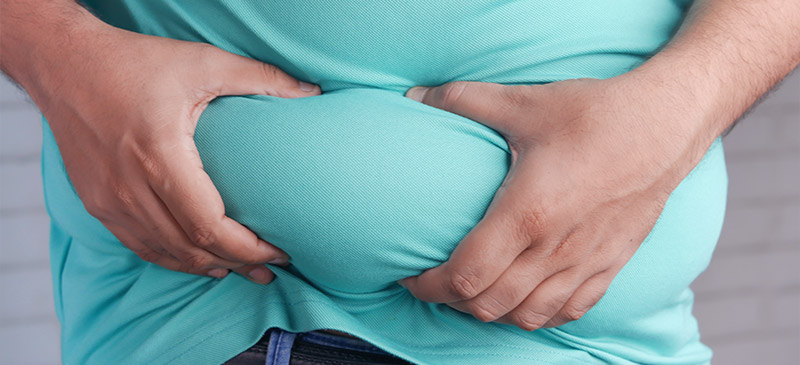



Weight Loss Guide for Women Over 40: 6 Things you MUST know
February 22, 2023Belly fat is a common problem for many people, and it can be particularly challenging to lose. Factors such as genetics and age can make it even more difficult to get rid of excess belly fat. However, there are strategies and solutions that can help you lose belly fat and improve your overall health and well-being. In this article, we will explore the science of belly fat, including the role of genetics and age, and share some effective solutions for losing it.
The Role of Genetics in Belly Fat
Genetics can play a significant role in the distribution of body fat, including belly fat. Studies have shown that some people are genetically predisposed to store more fat in their abdominal area, which can be more challenging to lose than fat stored in other areas of the body. Additionally, genetics can impact metabolism, hormone regulation, and other factors that influence body weight and fat distribution. While you cannot change your genetics, you can take steps to manage your weight and reduce belly fat through lifestyle changes.
One study conducted by the Harvard School of Public Health found that people with a specific gene variant known as the FTO gene are more likely to store fat in their abdominal area. This gene variant is particularly common among people of European ancestry, and those who carry the variant have a 30% higher risk of obesity.
Another study published in the journal Nature Genetics found that certain genetic variations can influence the way our bodies store fat and the distribution of fat in our bodies. The study found that people with a specific genetic variant known as the KLF14 gene tend to store more fat in their abdominal area.
While genetics can impact the distribution of body fat, it’s important to note that lifestyle factors also play a significant role in belly fat accumulation. Therefore, while you cannot change your genetics, you can take steps to manage your weight and reduce belly fat through lifestyle changes.
The Impact of Age on Belly Fat
As we age, our body composition changes, and we may experience a natural increase in belly fat. Hormonal changes, decreased muscle mass, and lifestyle factors can contribute to the accumulation of belly fat as we get older. However, it’s important to note that age is not an excuse for excess belly fat. With the right strategies and solutions, you can lose belly fat and maintain a healthy weight at any age.
One study published in the International Journal of Obesity found that middle-aged women who engaged in regular physical activity had less belly fat than those who were sedentary. Additionally, the study found that increased physical activity was associated with a lower risk of belly fat accumulation.
Another study published in the Journal of Gerontology found that resistance training, such as weight lifting, can help older adults reduce belly fat and maintain muscle mass. The study found that older adults who engaged in resistance training three times per week had a significant decrease in belly fat and an increase in muscle mass compared to those who did not engage in resistance training.
Therefore, while age can impact the accumulation of belly fat, it’s not a barrier to achieving a healthy weight and reducing belly fat. With the right strategies and solutions, it’s possible to achieve and maintain a healthy weight at any age.
Effective Solutions for Losing Belly Fat
Exercise: Regular exercise is one of the most effective strategies for losing belly fat. Cardiovascular exercise, such as running, swimming, or cycling, can help burn calories and reduce overall body fat. Strength training can also help build muscle mass, which can increase metabolism and help burn more calories. A combination of both types of exercise can be particularly effective for losing belly fat.
Healthy Eating: A balanced, healthy diet is crucial for losing belly fat. Focus on whole, nutrient-dense foods, such as fruits, vegetables, whole grains, lean proteins, and healthy fats. Avoid processed and sugary foods, which can contribute to belly fat accumulation. Additionally, studies have shown that a diet high in fiber can be particularly effective for reducing belly fat. One study published in the Annals of Internal Medicine found that a high-fiber diet was associated with a significant decrease in belly fat and overall body weight.
Stress Reduction: Chronic stress can lead to the accumulation of belly fat. Therefore, it’s important to incorporate stress-reducing activities into your daily routine, such as meditation, yoga, or deep breathing exercises. One study published in the International Journal of Obesity found that women who practiced mindfulness meditation had less belly fat than those who did not practice mindfulness meditation.
Sleep: Getting adequate sleep is essential for losing belly fat and overall health. Lack of sleep can disrupt hormones that regulate appetite and metabolism, leading to weight gain and other health problems. Aim for at least 7-8 hours of sleep each night. One study published in the American Journal of Epidemiology found that women who slept less than 5 hours per night had a significantly higher risk of belly fat accumulation compared to women who slept 7 or more hours per night.
Seek Professional Help: If you’re struggling to lose belly fat, consider seeking professional help. A qualified personal trainer, nutritionist, or physician can provide guidance and support to help you reach your weight loss goals. Additionally, they can help you develop a personalized plan that is tailored to your unique needs and goals.
In conclusion, losing belly fat can be challenging, but it’s not impossible. By understanding the role of genetics and age, and incorporating effective solutions such as exercise, healthy eating, stress reduction, sleep, seeking professional help, and, in some cases, surgery, you can achieve your weight loss goals and improve your overall health and well-being. With commitment and consistency, you can lose belly fat and live a healthier, happier life.





